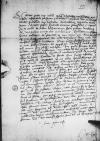List #330
Cornelis DE SCHEPPER do Ioannes DANTISCUSFraga, 1527-04-12
| odebrano Valladolid, [1527]-04-28 Rękopiśmienne podstawy źródłowe:
Pomocnicze podstawy źródłowe:
Publikacje:
| ||||||||||
Tekst + aparat krytyczny + komentarz Zwykły tekst Tekst + komentarz Tekst + aparat krytyczny
Magnifico et exc(ellentissimo) or exc(ellenti)⌈exc(ellentissimo)exc(ellentissimo) or exc(ellenti)⌉ Domino Ioanni Dantisco, regiae maiestatis Poloniae ad sacram caesaream maiestatem oratori etc., domino et patri meo observandissimo
Salutem.
Credere potes me nihil operae diligentiaeque omisissem, quo meum ass written over e⌈ess written over e⌉equerer plus quam ms. plusquam(!) ⌈plus quamplus quam ms. plusquam(!) ⌉ parentem. Quarto die ab incepto itinere prehendi iam lassatum itineratione, vegetum tamen senem. Mirari orig. Myrari⌈MirariMirari orig. Myrari⌉ possis, quantis omnium plausibus excipiatur. In eo omnem et totam Hispaniarum spem positam locatamque esse uno passim omnes ore conclamant. Equidem misereor huius candoris eo provecti, ut non desint, qui illius prudentiae, cum alias nequeant, hoc modo detrahant tamquam orig. tanquam⌈tamquamtamquam orig. tanquam⌉ meis ille consiliis iter hoc inchoarit. Sed ego quidem facile patiar hanc in me fabam coniectam esse, quippe qui adversus tales insultus animo sum plus quam ms. plusquam(!) ⌈plus quamplus quam ms. plusquam(!) ⌉ intrepido.
Vicecancellarius encrypted ⌈VicecancellariusVicecancellarius encrypted ⌉,[1] quem semper habuit, tandem animum explicavit. Mirabere et hoc, quanto ille apparatu ostentationeque hactenus occultarit virus id, virulentissimus homo. Dabitur id saeculo orig. seculo⌈saeculosaeculo orig. seculo⌉ huic saneque infelici orig. infoelici⌈infeliciinfelici orig. infoelici⌉. Lalmant encrypted ⌈LalmantLalmant encrypted ⌉[2] apud caesarem encrypted ⌈caesaremcaesarem encrypted ⌉[3] instetit encrypted ⌈instetitinstetit encrypted ⌉, ut ait, pro revocatione encrypted ⌈pro revocationepro revocatione encrypted ⌉, sed extra animum, neque adimplebit autem cupiditatem hanc malam. Nescio ominari successum harum rerum, adeo mihi videntur mirabiles. Italiae encrypted ⌈ItaliaeItaliae encrypted ⌉[4] passim multa T encrypted ⌈T undeciphered⌈[T]T undeciphered⌉T encrypted ⌉ facturum, modo caesari encrypted ⌈caesaricaesari encrypted ⌉[5] visum ita fuerit. Sunt et istic orig. isthic⌈isticistic orig. isthic⌉, qui res regis Angliae encrypted ⌈regis Angliaeregis Angliae encrypted ⌉[6] strenue agunt, sed, ut audio, minime successuris conatibus. Pontifex encrypted ⌈Pontifex(?)Pontifex encrypted ⌉[7] fertur praeclara quaedam orig. quedam⌈quaedamquaedam orig. quedam⌉ adversus viceregem encrypted ⌈viceregemviceregem encrypted ⌉[8] gessisse. Nescio, an vobis id quoque constet.
Caesarea est Augusta ad Hiberum flumen, quae nos humanissime excepit. Iam ad loca ea pervenimus, in quibus olim Caesar Petreium, Afranium et Marcum Varronem, Pompeii duces, sibi in potestatem redegit, inter Sincam scilicet et Sycorim satis celebrem Lucani etiam carminibus, tribus tantum leucis ab Ilerda. Quo postquam pervenerimus, videbis me copiosius scripturum esse, quandoquidem diem illic Palmarum celebrabimus. Tu interea scribe ad me, quae facies rerum sit istic orig. isthic⌈isticistic orig. isthic⌉. Plurimum enim id ego scire desidero orig. desydero⌈desiderodesidero orig. desydero⌉. Commendabis autem me imprimis tibi, deinde illustri domino comiti et magnificis dominis comitibus palatinis, confratribus meis, quos omnes iubeo tecum rectissime valere.
Ex Fraga ad Sincam, XII-o die mensis Aprilis anno Domini M D XXVII-o.
Tuus, quem nosti, C(ornelius) D(uplicius) Sc(epperus)
[1 ] Vicecancellarius symbol [S1] (double gibbet) used for Baltasar Merklin von Waldkirch; the solution of the cipher based on Dantiscus’ solution of De Schepper’s use of this symbol preserved together with the fair copy of IDL 427
[2 ] Lalmant (arrow right symbol): the solution of the cipher is based on Dantiscus’ solution of De Schepper’s use of this symbol, as preserved together with the fair copy of IDL 427
[3 ] caesarem (symbol A): the solution of the cipher is based on Dantiscus’ solution of De Schepper’s use of this symbol, as preserved together with the fair copies of IDL 355 and IDL 427
[4 ] Italiae (symbol X): the solution of the cipher is based on Dantiscus’ solution of De Schepper’s use of this symbol, as preserved together with the fair copies of IDL 355 and IDL 427
[5 ] caesari (symbol A): the solution of the cipher is based on Dantiscus’ solution of De Schepper’s use of this symbol, as preserved together with the fair copies of IDL 355 and IDL 427
[6 ] regis Angliae (symbol Q): the solution of the cipher is based on Dantiscus’ solution of De Schepper’s use of this symbol, as preserved together with the fair copy of IDL 355
[7 ] Pontifex(?) encrypted with the symbol B, which appears also in IDL 355 and IDL 2974. In the last case it surely stands for pontifex (the Pope). This meaning of the symbol B is also possible in both the earlier letters. However, such a solution is not certain and the cipher used in the letter IDL 2974 differs from that used in the other letters
[8 ] viceregem (symbol S): the solution of the cipher is based on Dantiscus’ solution of De Schepper’s use of this symbol, as preserved together with the fair copy of IDL 355


 BCz, 243 p. 76
BCz, 243 p. 76